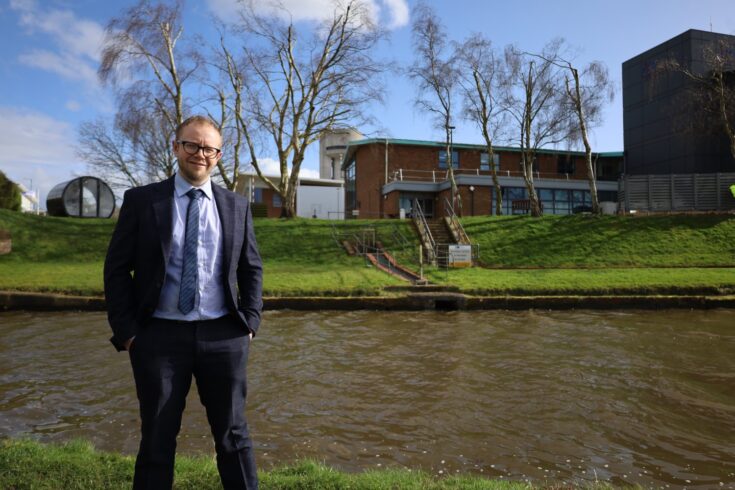I recently completed the Science and Technology Facilities Council (STFC) graduate scheme as a Control Systems Engineer. I started in September 2020, joining the Control Systems and Safety Interlocks group.
Working as a graduate at Daresbury Laboratory, I have had the opportunity to be involved with many inspiring and world-leading projects. Some of my favourite projects have included work on the CLARA particle accelerator, working with big data, artificial intelligence and data analysis.
As well as the projects I worked on at the lab, I was also able to undertake a placement at CERN. People know about the apprenticeship schemes and PhDs, but I wanted to highlight my experience with the graduate scheme and how it supports people beginning their careers in science, technology, engineering and maths (STEM).
What is the STFC graduate scheme?
STFC’s graduate scheme provides invaluable opportunities to those who, like me, have just completed their university degree. The scheme provides supported technical training, career support and wider training and development. We have a dedicated early careers team, who provides a balanced amount of challenge and support throughout the two-year scheme, helping everyone achieve their ambitions within STEM.
From my experience, there is no single career path when joining the STFC graduate scheme. The diversity in our organisation means that there are a variety of routes to choose from. Each year STFC hires a group of graduates in many different areas, from engineering, computing, business support, communications and much more.
Joining the STFC graduate scheme
In my experience, the STFC graduate scheme has been fantastic. It allowed me to get all the training and experience needed for my desired job role, straight after finishing university. When I first started in my graduate role, I was instantly a core member of the team, being exposed to fascinating and mind-blowing big science. Being able to experience these opportunities and challenges, helped me to really develop and work on my expertise and technical ability.
My journey into the graduate scheme was probably the most unconventional. However, I believe many, especially from my generation, will be able to resonate with my experience.
The start of my graduate scheme began during the COVID-19 lockdown. Due to government restrictions and the uncertainty surrounding the pandemic, I worked remotely, relying on Zoom for catchups and team learning. Luckily, I had completed an industrial placement year with the same team during my university degree. This helped me as I had prior knowledge of the team, the relationships and how we all worked together.
Despite working from home for part of my graduate scheme, I still had the opportunity to engage in so many projects and challenges. Through the scheme, I was also able to pursue my professional interests in other career areas, whilst still being supported by my line manager, my wider team and the early careers team. Some of these included people management skills – as a Daresbury Laboratory graduate liaison and social representative.
I also worked on my interview skills, as part of my contribution to the organisation of the graduate conference. Moreover, I was able to build a strong network with the other graduates from across STFC’s sites, attending weekly Zoom meetings, online games, in-person networking events and team-building exercises.
Personal challenges and growth
Throughout the graduate scheme, I had to take significant time off work to undergo chemotherapy and to have an operation. Although this was a very difficult time for me, STFC colleagues supported me in any way they could. My team ensured I had the opportunity to join regular meetings if I felt up to it, making me feel involved and up to date on current projects.
The STFC graduate team also ensured I had all the resources needed to keep me up to date on the programme. It was really uplifting that my colleagues understood and made changes to accommodate my needs under the challenging circumstances.
A graduate placement at CERN
As part of the graduate scheme, everyone has the opportunity to undertake a placement in another department or at another research facility for three months. When an opportunity for me to go to work and live at CERN arose, I knew it was an opportunity I couldn’t turn down.
My placement at CERN was fantastic, I met so many incredible and gifted people and was openly welcomed into a professional and student community. Whilst at CERN, I was working on the Compact Linear Collider (CLIC) project, verifying the results of a machine learning study. My work involved analysing the data that had been collected from breakdown testing and determining any features within that data that could be used to predict future breakdowns occurring.
Here I had the opportunity to write Python code scripts, which manipulated large data sets and plotted the results. This enabled me to identify any potential breakdowns in the CLIC. If you can predict a potential breakdown, you are more likely able to prevent it from happening or compensate for its effect. This project amazed me as I was able to contribute to the improved quality of the particle beams created.
Early career networking opportunities
When I wasn’t working, there were so many things to be involved with. I really enjoyed that there was another STFC graduate from the Rutherford and Appleton Laboratory, Will Atkinson, on placement at CERN at the same time as me. He was working in the knowledge transfer department, and it was great to get to know someone from a completely different part of the organisation – some international, cross-site networking for us both!
CERN also has some really active social groups, which is brilliant. I spent Wednesday evenings with the CERN choir and Thursday evenings playing cricket with the CERN cricket team. I got to play a few games in the Swiss cricket league and was also able to take advantage of the good transport networks from Geneva. I particularly enjoyed a trip to the Jura Mountains and visits to both Bern and Luzern.
What happens after the graduate scheme?
After completing my graduate scheme, I continued to work at Daresbury Laboratory as a Control Systems Engineer. Here I am working with accelerator physicists and engineers to develop and deploy bespoke control systems for several experimental facilities. These systems manage the interdependency between hardware and software, allowing operational data from that facility to be collected and the operations to be controlled safely and reliably.

Credit: Megan Watson
My path to a career in STEM
At school, I particularly enjoyed maths and electronics and knew I wanted to incorporate them into my future career somehow. I will always remember my secondary school’s electronic teacher Mr Mayes. His teaching style and openness about his non-teaching experience were a huge influence on my interest in electronics and technology. Without him, I don’t know if I would have fallen in love with the subject and found a career doing something I love.
Engineering appeals to me because I love the idea of harnessing knowledge to create devices which solve world problems and challenges. Working at STFC allows me to contribute towards the discovery of new technologies which may help and resolve these current problems. The idea that the contributions I make at work could potentially change the future, excites me and sparks a desire to continue working in STEM and achieving my professional goals.
Undertaking a career in something you have such a high passion for is amazing. I come to work every day and learn something new and exciting, and every day is completely different.
While on the graduate scheme I was able to undertake and participate in public engagement opportunities, speaking to those aspiring to work in STEM or thinking about their career after education. I have continued to do this after the completion of the graduate scheme, perhaps Mr Mayes instilled a little bit of himself inside me in my year nine electronics class!
Advice for those in education
If I could give one piece of advice to those still in education, I would just say “go for it”. STFC offers so many opportunities for people in their early careers.
Still in high school but don’t quite know what your future will look like? Come and undertake one of our summer placement schemes. Don’t know what to do after school? Join our fantastic apprenticeship scheme. At university and don’t quite know what your ‘real’ job will look like? Undertake a year-long industrial placement. Finished university, but don’t know what to do next? Apply for one of our graduate scheme opportunities.
I can’t express enough how much I learnt from doing an industrial placement year while at university. It helped to define my future and pushed me to apply for a graduate role here at STFC. Now that I have completed my graduate scheme, I can see how much I learnt both at Daresbury Laboratory and CERN. Both opportunities provided me with endless experience and allowed me to network with people who work in the same fields as me and have similar interests as myself.
My advice for those thinking about pursuing a career in STEM would be to make sure to consider all the alternatives to the traditional educational route after school. Although I wouldn’t change the route I have taken, there are now so many other options, including apprenticeships and practical work experience schemes.
Further information
Find out more about:
Top image: Credit: Megan Watson



